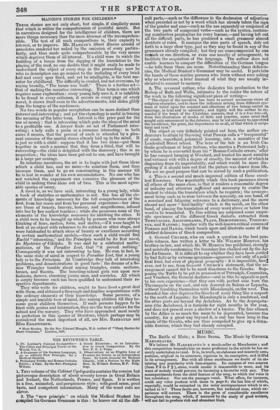MANGIN'S STORIES FOR CHILDREN.* THESE stories are not only short,
but simple, if simplicity mean that which is within the comprehension of youthful minds. But
in narratives designed for the intelligence of children, there are More things necessary than the mere absence of the incomprehen- sible. The test of all such compositions is, their capacity to
interest, or to improve. Mr. MANGINS Short Stories consist of
anecdotes rendered too naked by the omission of every particu- larity, and thus made quite comprehensible by the very means
which deprives them of all interest. If a child were to watch the
building of a house from the digging of the foundation to the placing of the roof, no one doubts that it might easily be made to understand the object of every step in the proceeding: now he who in description can go nearest to the including of every brick laid and every spar fixed, and yet be intelligible, is the best nar-
rator for childhood. The difficulty is evaded, and not overcome, by saying broadly, "The house was built." There is a further art— that of making the narrative interesting. This term is one which requires some explanation : every young lady uses it, it is infallibly to be found in every criticism, it occurs in every page of every novel, it shows itself even in the advertisements, and slides glibly from the tongue of the auctioneer. No two words in popular acceptation can be more distinct than interest and interesting; and yet the etymology is useful in tracing the meaning of the latter term. Interest is the price paid for the use of money : that is interesting which puts the ideas of the mind to a profitable use. A lawyer finds an act of Parliament inter- esting; a lady calls a poem or a romance interesting: in both cases it means, that the perusal of each is attended by a plea- sant exercise of the mental stores already laid up in the mind. It is just so with a child: suppose that it has two ideas—put them together in such a manner that they form a third, that will be interesting—the child is delighted with the discovery; this is an acquisition ; the ideas have been put out to use, and have brought in a large per centage. In infantine narratives, the art is to begin with just those ideas which a child has, and no more—to combine them, and thus increase them, and to go on constructing in this manner till be is lost in wonder at his own accumulations. No one who has not watched the experiment can conceive the pleasure of the child in making three ideas out of two. This is the most agree- able species of usury. A novel is, as we have said, interesting to a young lady, while a book of statistics or mathematics is not. She has all the ele- ments of knowledge necessary for the full comprehension of the first, from her nurse and from her personal experience—her ideas are those of beauty, bravery, honour, and magnificence, infused into her by her earliest teachers ; while she possesses none of the elements of the knowledge necessary for imbibing the other. If a child were to be brought up wholly by persons who were always thinking of lines, motion, form, and matter,—if it were taught to look at an object with reference to its cubical or other shape, and were habituated to attach ideas of beauty or excellence according to certain mathematical models,—then such a child would find Euclid "interesting," and the Principia would be its first novel, its Mysteries of Udolpho. It was said by a celebrated mathe- matician, of the Paradise Lost, that "it proved nothing.' Consequently it was not interesting to him. He was, in fact, in the same state of mind in respect to Paradise Lost, that a young lady is to the Principia. At Cambridge they talk of interesting problems, and demonstrations in good taste: the dreams of a Se- nior Wrangler tumble about among triangles, conic sections, lenses, and fluents. The boarding-school girls run upon new fashions, dances, charming young men, and curricles. All which is simply because each has been qualified to understand their re- spective departments. They who write for children, ought to have lived a great deal with them, and obtained a thorough and familiar acquaintance with the ordinary elements of their knowledge. Some persons, of a simple and amiable turn of mind, live among children till they be- come great children themselves. If such persons happen to be blest with genius and information, they are the true authors for the school and the nursery. They who have approached most nearly to perfection in this species of literature, which perhaps may be considered the most important of all, are Mrs. BARBAULD and Miss EDGEWORTH.
* More Stories. By the Rev. Edward Mangin, M.A. author of "Short Stories for Short Students," London, 1830.


























 Previous page
Previous page